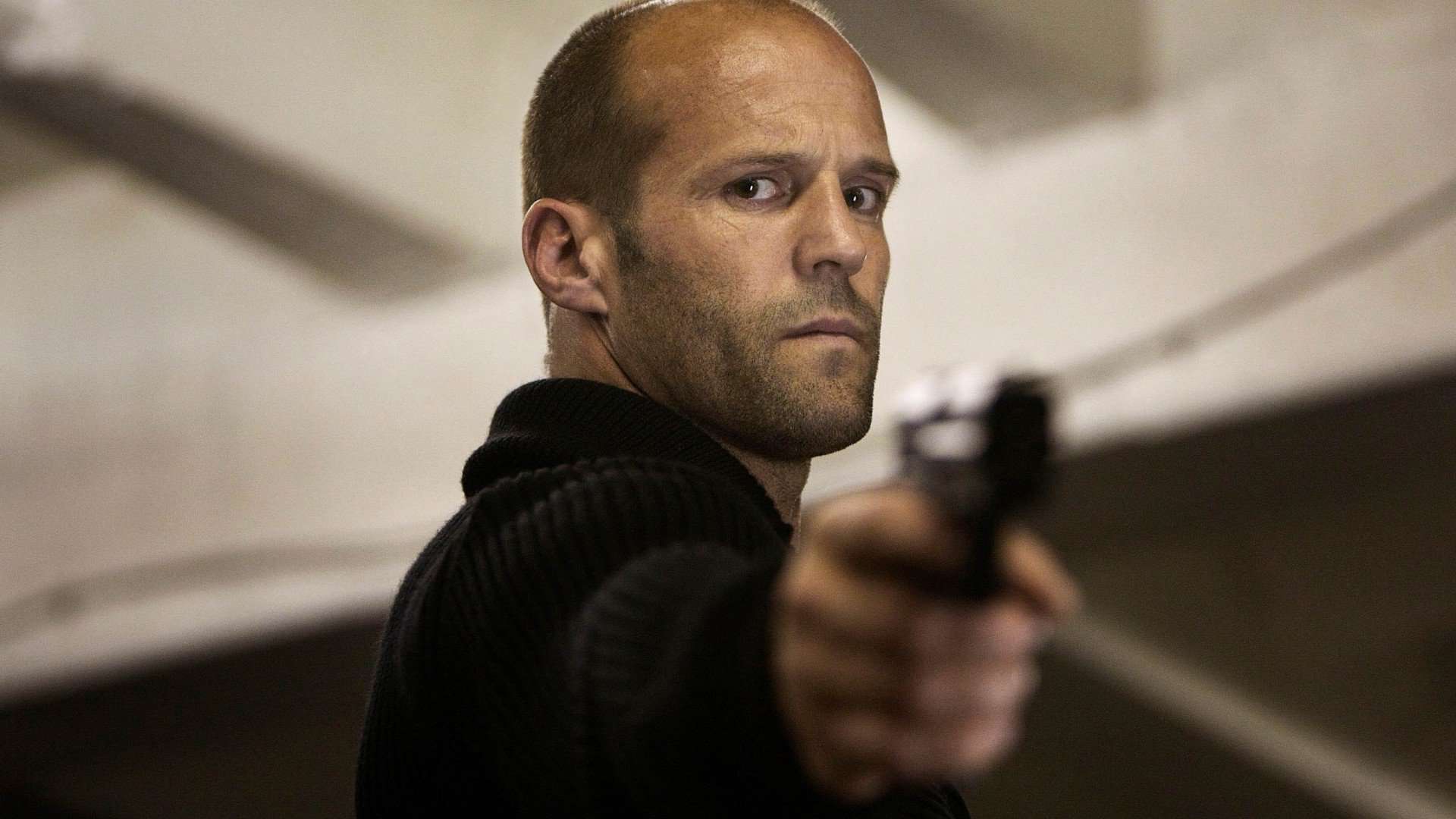Being Jason Statham
One of the reasons Jason Statham is such a great action hero is that he has successfully created an on-screen persona for himself. We don’t see his new movie to find out what great new character he’s going to play; we see his new movie to see Jason Statham. I would argue that Statham has done this better than anyone since Arnold Schwarzenegger; in much the same way as these characters are all really Jason Statham, Arnold’s characters were all really Arnold (bar a couple of exceptions, like the Terminator and Conan). There have been others; Steven Seagal, Jean-Claude Van Damme, etc. But those guys kind of fell into it by default; Arnold and Statham make it seem like it was a conscious decision to turn themselves into the draw.
What they’ve also done better than anyone else in the action field is to subvert or otherwise comment on their personas. Arnold did it with comedies like Kindergarten Cop and Twins, but Statham has been doing it pretty consistently within the action movies themselves. This is really smart, a way of having his cake and eating it too; he can make the movies we all want to see, where he kills lots of bad guys with his bare hands, but also stretch himself just a bit and play with Jason Statham the personality. He does this in two different ways.
*Spoilers for the movies mentioned; feel free to skip around if you missed something*
Jason Statham in Self-Imposed Exile (Redemption, Wild Card)
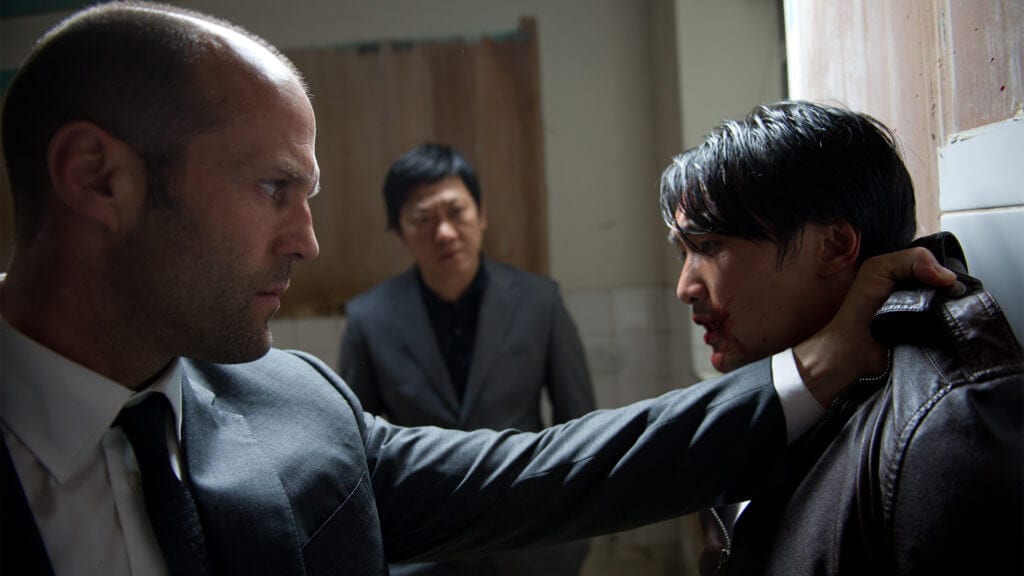
This is Jason Statham deciding not to be Jason Statham, and over the course of the film learning the value of being Jason Statham again. In Redemption, it’s his actions as a Special Forces soldier in Afghanistan that push him to give up his persona. He used being Jason Statham to do some dark, twisted things, killing innocent people as he made his way through the country, and it so horrified him that he deserted the military and ran home to London. Now he lives on the streets, drinking himself to death because, as he explains later, “When I’m sober, when I’m healthy and well, I hurt people. I drink to weaken the machine they made.” Being the Jason Statham persona has an ugly side, and he’s so afraid of it he forces it away with vodka and self-loathing. And it works. When we first see Statham in this movie, he’s living in an alley with other homeless people, wearing rags and long, stringy hair that falls over his dirty face. When two thugs come along to extort money from the homeless, Statham lets himself get knocked around. We know Statham can destroy these guys, and so does he, but he won’t allow himself to become that figure again…
Until the girl he’s with is in danger. When it looks like she’s about to get really hurt, he lets loose with a headbutt so mighty it knocks one of the punks down and the girl is able to get away; even through the booze that inhibits him, Jason Statham can come through when he’s really needed. Then he lets go once more and allows himself to be beaten until finally running away. (He may not want to fight, but he doesn’t want to die either.) He finds his way into the apartment of a well-off man who won’t be home for several months and decides to live there as long as he can. Looking at himself in the mirror, he can see, past all the muck and pain, the man he used to be, the man he still is deep down. He cleans himself up and begins to look like the Statham we remember. He gets a job in a Chinese restaurant and starts to live the normal life he wants, away from violence.
But violence finds him when a group of hooligans won’t leave the restaurant and he’s asked to deal with it. Statham gets them outside, but they just won’t go away. One of them throws a punch and this time Statham doesn’t take it; he fights back and beats several of them into the ground. When the Chinese gangsters who run the restaurant get word of this, they offer him a job as an enforcer. Realizing that he’ll never be rid of the Jason Statham persona, he accepts, owning who he is and using it to do whatever good he can. He gives his money to a nun he’s become friendly with, as well as to his ex-wife and his daughter. He faces the two extortionists once more and breaks their bones, making sure they’ll never hurt the homeless again. He tries to find the girl from the opening, who turns out to be a prostitute, but she’s been murdered, so he hunts down the budding serial killer who did it and throws him off a roof. When he comes across a slave-trading operation, he gives the police enough information to lock them all up.
And then he’s done; he tells the nun he did a little good and now he’s going back to drinking, suppressing Jason Statham once again. The final moments indicate that the police are about to arrest him, which seems like a sad ending; he’s drunk again and in no condition to escape. But consider this: when he’s locked up, he won’t have access to booze and will inevitably become Jason Statham again. How long do you think they’ll be able to hold him?
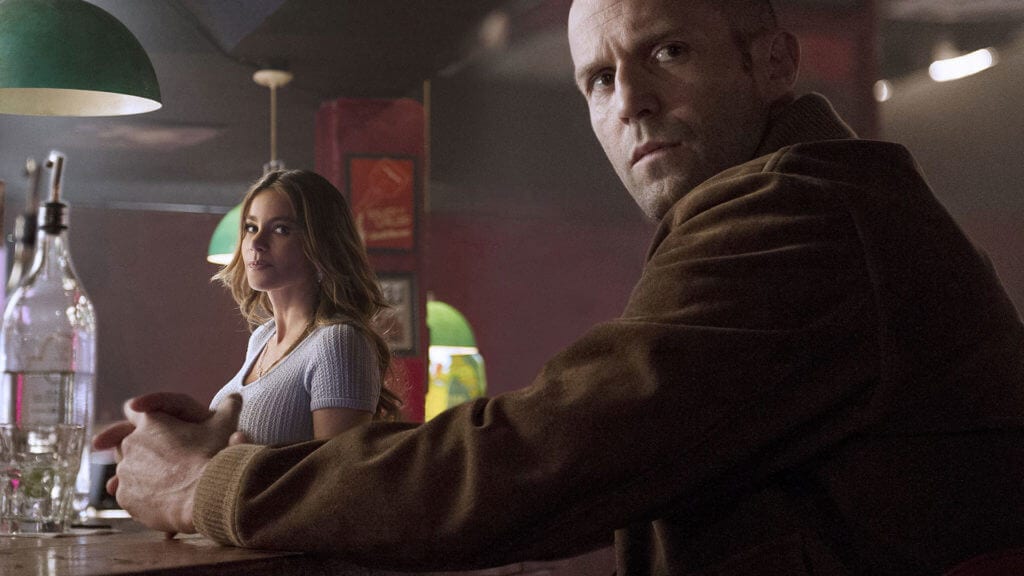
Wild Card sees Statham in a hell of his own making, working as a security expert in Las Vegas. He’s a former Special Forces guy again, but he’s keeping a low profile in Sin City, hoping to make $500,000 to support himself for five years so he can leave Vegas for good. To get by, he’s again suppressing the Jason Statham persona, not rocking any boats and staying out of trouble. When his friend Holly asks for his help finding the gangster who beat and raped her, he initially turns her down. Ordinarily, of course, Statham would find the guy in no time and take him apart piece by piece, but he’s trying not to be Jason Statham, just surviving until he can leave, and crossing the mob would be too much trouble. At the same time, some rich kid from Boston named Cyrus wants to hire Statham to protect him while he gambles; this is later revealed to be a ruse, and Cyrus really wants Statham to show him how to be a man, which Statham also refuses.
Why do these two go to him? Because, as much as he tries to hide it, everyone around him knows he’s Jason Statham. Holly and Cyrus are stand-ins for his fans, wanting to see him be Jason Statham and pushing him to accept that persona. Statham resists, but eventually gives in because that’s who he is. He helps Holly track down her attacker and get some payback, and he inspires Cyrus to man up and do something wild and dangerous, something all of Cyrus’ money couldn’t buy him.
In return, Holly and Cyrus help him. Statham could’ve left Las Vegas any time he wanted to; the money was just an excuse because he was scared. He plays Blackjack at a casino and wins the $500,000 he says he needs, then decides to play again and loses it all. He cooks up some excuse about being a gambling addict, but it comes out of nowhere and seems inconsistent with his character. That’s because it’s a lie; he threw away the money because Vegas is all he’s known for so long, and though he hates it, he believes it’s the only thing of which he’s worthy, so he’ll sabotage any chance at escape that comes his way. But when he gets involved with Holly, he’s got motivation to leave: the gangsters he ticked off will be coming for him. And with Cyrus, he’s got the means, as Cyrus gifts him the $500,000 in return for helping him to be brave.
Finally, he’s ready to be Jason Statham. When the gangsters come for him, he takes a butter knife (hell yes he does!) and slaughters them in an alley, letting the head bad guy punch him over and over, feeding off the violence, before finishing him off once and for all. There is a natural progression to this through the fights in the movie: first he knocks out the gangster and his two bodyguards in their hotel room, quickly and effortlessly dispatching a trio of chumps; then he takes apart a whole squad of thugs sent to bring him to his death, demolishing a casino in the process and asserting that he does, deep down, want to live; and, finally, he kills everyone coming after him in an alley, demonstrating that he will not live his life in fear of anyone. When he rides out of Vegas, he is Jason Statham, proudly and assuredly, and woe be unto anyone who crosses him.
Jason Statham in Forced Exile (The Mechanic and Mechanic: Resurrection, Safe, Homefront)
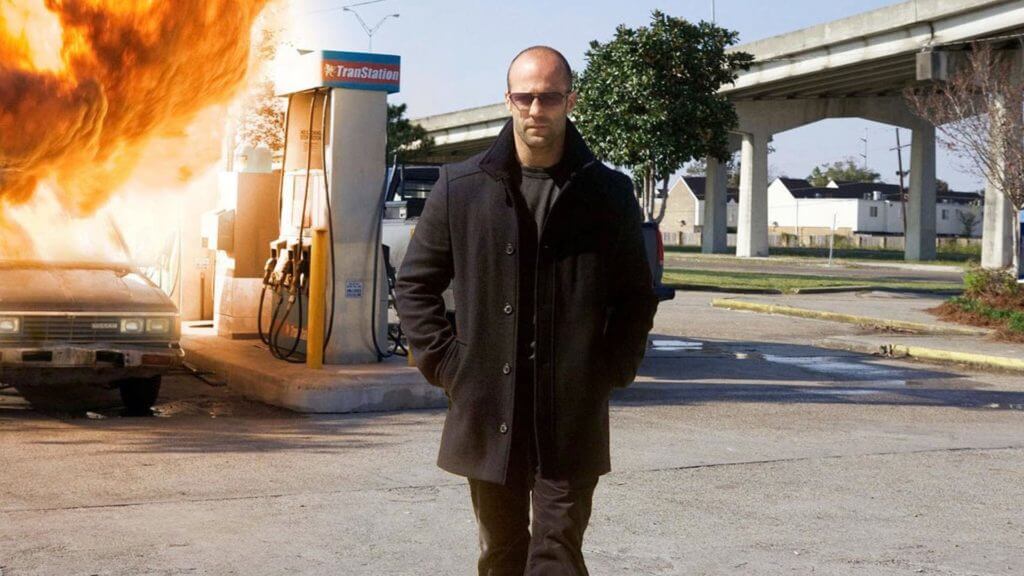
In these movies, Jason Statham is pressured by external forces to stop being Jason Statham. I’m convinced it’s deliberate because in each case, it’s the villains who are keeping Statham from being Statham, in one way or another. In The Mechanic, it’s through their employment of him. Statham is an assassin working for a firm that has him kill their targets in such a way that the deaths look like accidents. Now, when we go to see a Jason Statham movie, we want to see him let loose and completely wreck anyone foolish enough to oppose him; that’s what’s so fun about him. But the firm (which I don’t believe is ever given a name) constrains him, and this is our first indication that they’re the bad guys – they’re the ones depriving us of the Statham action we crave.
Following these rules is what gets Statham in trouble. In doing what he’s told, he’s manipulated into killing his best friend Harry for supposedly selling out the firm’s clients, then takes on Harry’s son Steve as a protégé out of guilt. Steve is the absolute wrong fit for the company; he’s careless and takes ridiculous risks, such as fighting this massive killer from another firm that could break Steve in half with a backhand instead of simply poisoning him as instructed. He’s a liability, and Statham’s boss knows it, but Statham insists on keeping him aboard.
Why? The textual answer is that he feels responsible for Steve after killing his father. But going with the theme of Statham’s suppression of his true self by outside forces, the kid reminds him of himself; of the real Jason Statham. Steve has the fire in his belly, the desire to let loose and destroy without finesse. He reminds Jason Statham of what it means to be Jason Statham. He also starts to bring out Statham’s true nature, if inadvertently. When they perform the hit on the cult leader, Steve is the one who messes up and gets them noticed, leading to a shootout/smackdown that feels more up Statham’s alley than poisoning someone and slinking away. Deep down, Statham is yearning to break free from the prison of propriety (albeit one of killing people) in which he’s been caged.
But the real change comes when Statham sees one of his fellow mechanics – one of the ones supposedly killed by Harry – at the airport. For once refusing to simply do what he’s told, Statham follows the assassin and finds out that Harry wasn’t a traitor, and that his boss was actually the one betraying clients for extra cash. This is what really sets him free, and in an instant, our Jason Statham is let out in a spectacular fight on an airport shuttle bus. From here on out, Statham is Statham again, guns blazing, fists flying and necks snapping. He even drops the idea of taking the bad guys by surprise, making sure his boss knows he’s coming (in one of my favorite Jason Statham lines). And when it’s over, and he finds out Steve has discovered he killed Harry, Statham escapes death and kills Steve, washing his hands once and for all of the entire business. He’s Jason Statham now, and that’s all there is to it.
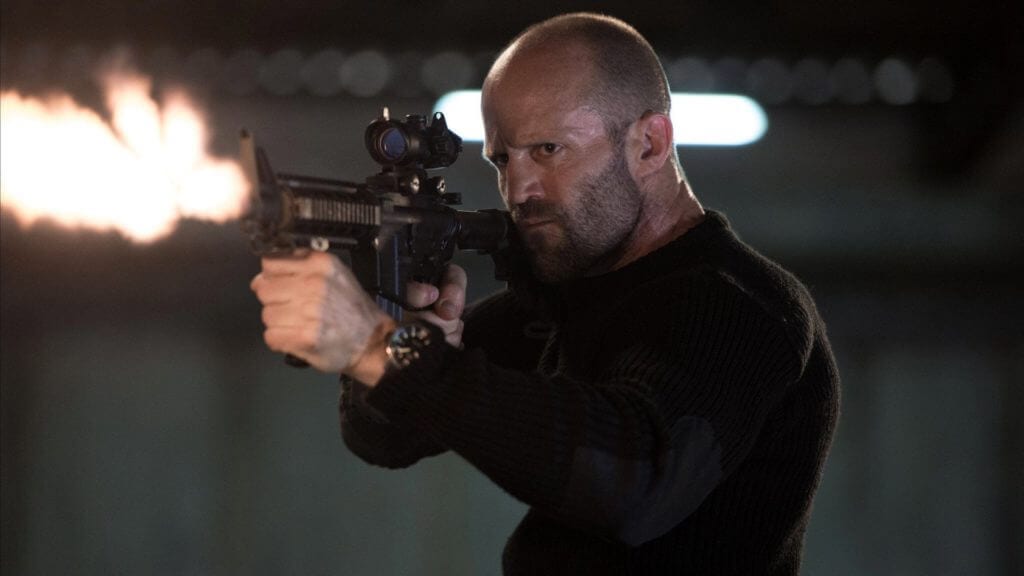
Mechanic: Resurrection (I’m going to keep my comments on this one brief because I already reviewed it) finds Statham traveling the world at his leisure, content with being Jason Statham. Inevitably, of course, evil comes for him, this time in the guise of an old friend who wants to punish him by forcing him to become a mechanic again, once more suppressing Jason Statham and abiding by those confining rules. You can see the transformation on screen; when the bad guys first approach Statham, he decimates them in a big fight scene befitting a Jason Statham movie. It isn’t until they kidnap love interest Jessica Alba that Statham agrees to become the more precise, secretive hitter he once was. He’s only able to turn the tables on the villains when he fakes his final hit and goes after them Statham style, once more accepting the Jason Statham persona and winning because of it.
I’m also going to be brief about Safe because I don’t like it (has a movie ever gone further out of its way to be as unsatisfying as this?), but thematically it fits my thesis, so it bears mentioning. In Safe, Statham is a cage fighter who wins a fight the Russian mob wanted him to lose. They then murder his wife and tell him that they will be watching him and will kill anyone he befriends, or even talks to. He’s forced to be homeless, and even when he gives his shoes to another homeless man at a shelter, the Russians murder the guy. He’s afraid of his own shadow because innocent people will be killed, so once again Jason Statham is suppressed.
Then he sees a little girl being chased by the same gangsters who forced him into exile, and suddenly he snaps. Done giving in to these evil creeps, he becomes Jason Statham again and annihilates the guys pursuing the girl. Then he rips through the Russian mob and their associates, killing everyone in his path to let them know who the real danger is. Safe drops the ball hard in the third act and ruins everything that has come before, but up to that point, it’s great seeing Statham pay these guys back, and reinforce that being Jason Statham is the answer to all of his problems.
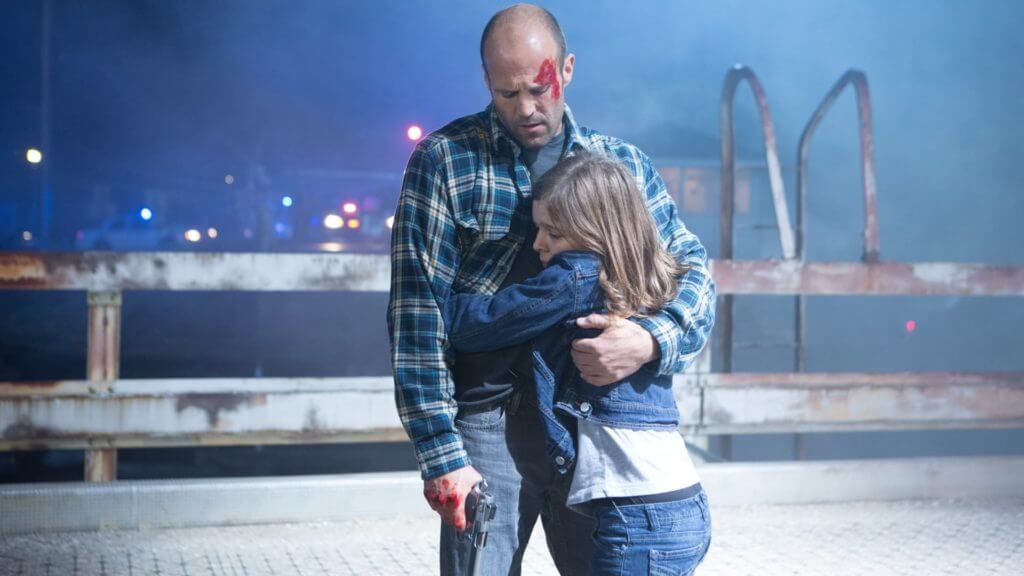
In Homefront, it’s fear of the bad guys that forces Statham to suppress his true nature. This time he’s a DEA agent who, in the beginning, goes undercover to bust a drug-dealing biker gang. Of course, Statham kicks much rear end during the bust, but while bringing in the head honchos, the ringleader’s son is killed. As a result, Statham’s daughter is threatened, so he relocates to a small town in Louisiana with her (his wife is dead from an illness). Here he lives a very uneventful life, working as a carpenter instead of breaking the heads of criminals, taking his daughter to and from school, and just generally trying to mind his own business. Jason Statham has effectively been put out to pasture.
As with The Mechanic, his true nature is reflected in another, this time his daughter. She’s bullied at school, and though she tries to be peaceful about it, she finally beats the punk senseless, just like her father – her true father – would do. And, again just like in The Mechanic, as well as Wild Card, it’s by the example of someone else, someone who admires the real him, that Jason Statham starts to return. When the bully’s father goes after him in the parking lot, Statham destroys him. The sheriff comments that Statham’s reaction was excessive, likely the result of keeping his instincts suppressed for so long; still, Statham holds his true nature at bay.
The harassment continues, though, as his dustup with the bully’s father gets the attention of local drug dealer – and bearer of perhaps the greatest villain name ever – Gator Bodine (played by James Franco; how could anyone not love this movie?). Gator is small time, and Statham barely breaks a sweat when dispatching his thugs, but the true danger comes when Gator finds out about Statham’s past and gets word to the jailed leader of the biker gang. Suddenly, some very dangerous people roar into town with homicide on their minds. Now Statham has no choice but to become Jason Statham again, fully and without hesitation, and only then can he save his daughter and kill the rest of the bikers. And when the dust settles, Statham does what he should’ve done from the beginning and pays a visit to the biker leader in prison, telling him that as soon as he is let out of prison, Jason Statham will straight up murder him. He’s now fully embracing the Jason Statham persona, and his daughter is finally safe because of it.
***
Does a star become a legend when his onscreen persona becomes a living, breathing thing? If so, Jason Statham is already there. We know who he is, we know what we want from him, and based on a lot of his films, he understands that. That’s part of what makes him so much fun, and why he’s really carrying the action hero torch in the modern era. That he’ll use that torch to beat evildoers to a pulp before burning them alive is a given, because he’s Jason Statham and he knows it.

